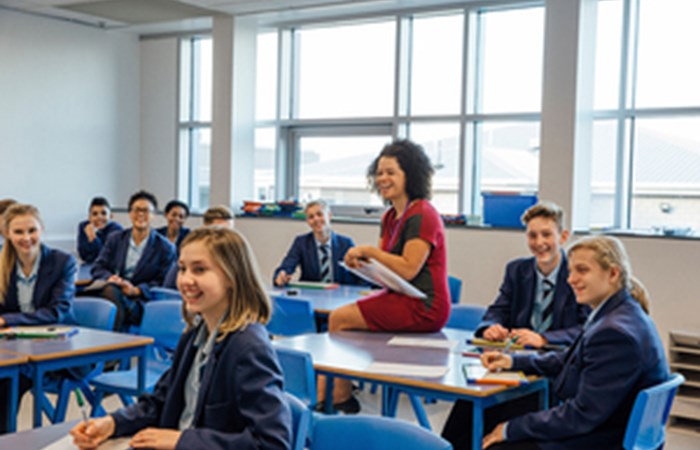Department For Education

Pupils across the country will soon be able to take the British Sign Language (BSL) GCSE as the subject content has today (Thursday 21 December) been published, providing pupils with an important life skill and advancing inclusivity within education.
Parents, teachers and organisations from the deaf and hearing communities have provided overwhelmingly positive support for the introduction of the BSL GCSE, following a 12-week public consultation.
The responses have helped ensure the content is knowledge-rich, diverse in its teaching and challenging. Students who take this GCSE will learn to communicate effectively with other signers in work, social and academic settings and possess valuable life skills.
With the aim to have exam board syllabuses approved from September 2025, the BSL GCSE will teach students to effectively communicate using BSL and provide an understanding of the history of BSL in the UK.
Education Secretary, Gillian Keegan said:
Its fantastic to see such an overwhelming amount of support across both the education sector and the deaf and hearing communities for this new GCSE.
Studying British Sign Language can open so many doors for young people, giving pupils an understanding of how thousands of people communicate and ultimately even expanding job prospects.
This new qualification will not only break down barriers and give young people valuable new skills, but also celebrate the history and rich culture of British Sign Language.
Deputy Chief Regulator of Ofqual, Michael Hanton said:
Were grateful to those who engaged with our consultation, which was a crucial step forward for this new and important qualification.
We will now begin the detailed regulatory work to ensure that the new GCSE in British Sign Language will be high quality and fair for students.
Influencer and activist for the deaf community, Tasha Ghouri said:
Its so important to have inclusivity in schools.
Accessibility is something I massively stand for and its amazing that BSL is now a GCSE course and students will soon have the opportunity to learn the foundations of BSL, the history and how it was formed.
Its such a beautiful language to learn. Thank you to everyone who has supported this step in the right direction!
Chief Executive of the National Deaf Childrens Society, Susan Daniels OBE said:
After more than a decade of campaigning for a GCSE in British Sign Language (BSL) were delighted we now have the finalised course content published.
A GCSE in BSL is vital as it will break down barriers and celebrate the rich culture and history of British Sign Language. An incredible amount of work has been undertaken to get to this point, not least from young deaf campaigner Daniel Jillings who fought so hard for the right to study a GCSE in BSL.
In line with all qualifications, the GCSE is open to all pupils and will be recognised and accepted in school and college performance tables.
An internationally recognised qualification, pupils who study this will develop ways of expressing and negotiating meaning through visual spatial language, communication and visual memory skills that will be an advantage to them for the rest of their lives.
As well as learning how to sign effectively, theGCSEwill also give students an understanding of the history of sign language in the UK. This will provide a solid foundation for students understanding of how the language reached its current form.
The introduction of this high standard, knowledge rich subject follows on from GCSE and A level reforms brought in since 2010 to ensure improvement to qualifications, ensuring they reflect the knowledge and skills pupils need.
Expanding on this, in October, the Prime Minister set out a bold new plan to introduce a new baccalaureate style qualification. The Advanced British Standard (ABS) will be built on A levels and T Levels, retaining their rigour and focus on building knowledge.At the heart of these proposals are an increase in teaching time of around 200 hours over the course of the qualification, greater breadth and choice for young people, and a core focus on vital maths and English. The ABS will widen students career options whilst bringing England in line with major economies such as France, Germany, Japan and the USA.
The recently published special educational needs and disabilities (SEND) and alternative provision (AP)improvement planset out how all children and young people, including those who are deaf or have a hearing impairment, will get the support they need to succeed in their education.
DfE media enquiries
Central newsdesk - for journalists 020 7783 8300
Related Articles
Comments
Write a Comment
Ministerial Departmental News
- PM's Office, 10 Downing Street
- Cabinet Office
- Department for Business, Innovation and Skills
- Department for Communities and Local Government
- Department for Culture, Media and Sport
- Department for Education
- Department for Environment, Food and Rural Affairs
- Department for International Development
- Department for Transport
- Department for Work and Pensions
- Department of Energy and Climate Change
- Department of Health
- Foreign and Commonwealth Office
- HM Treasury
- Home Office
- Ministry of Defence
- Ministry of Justice
- Northern Ireland Office
- Scotland Office
- Wales Office
- See all departments
